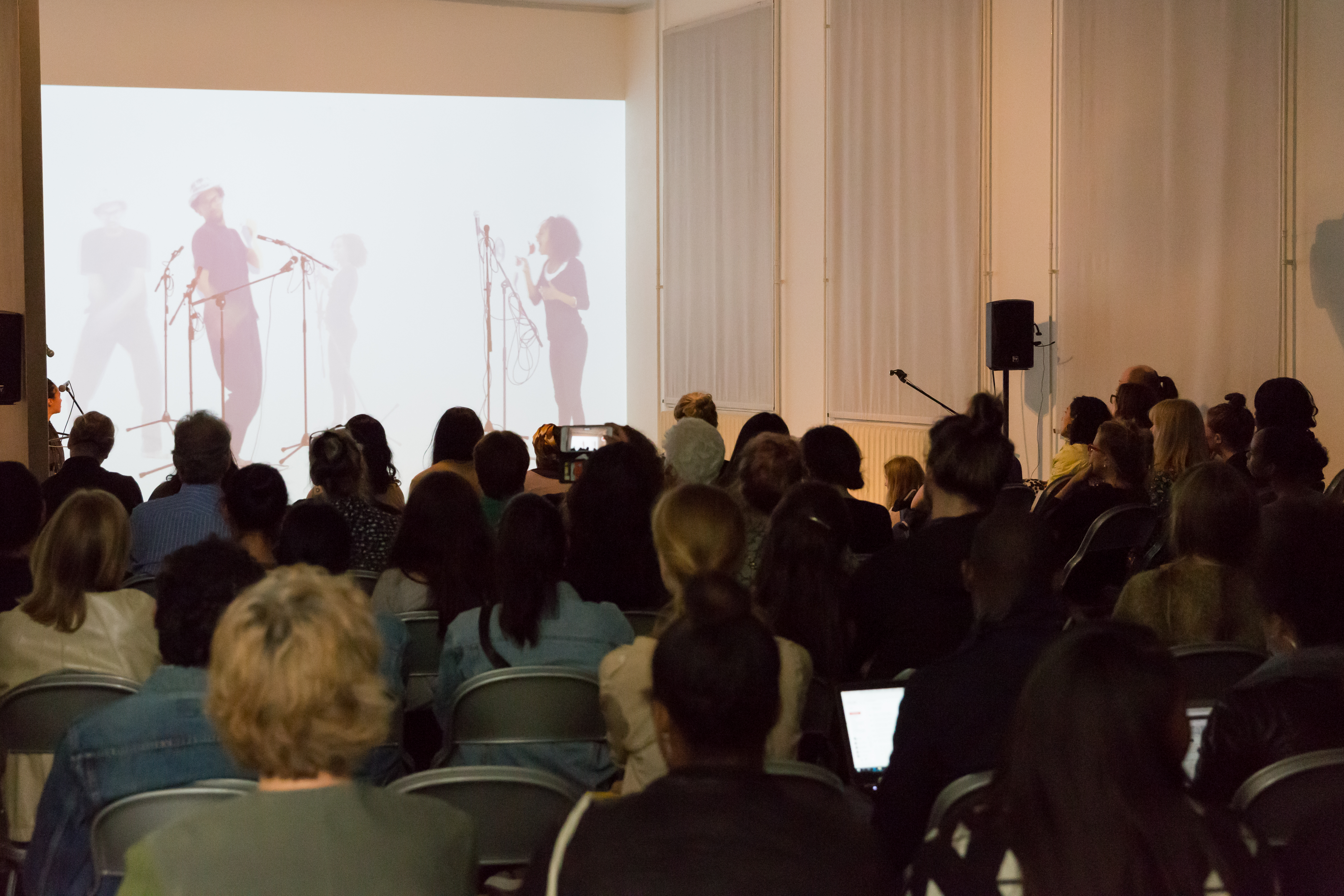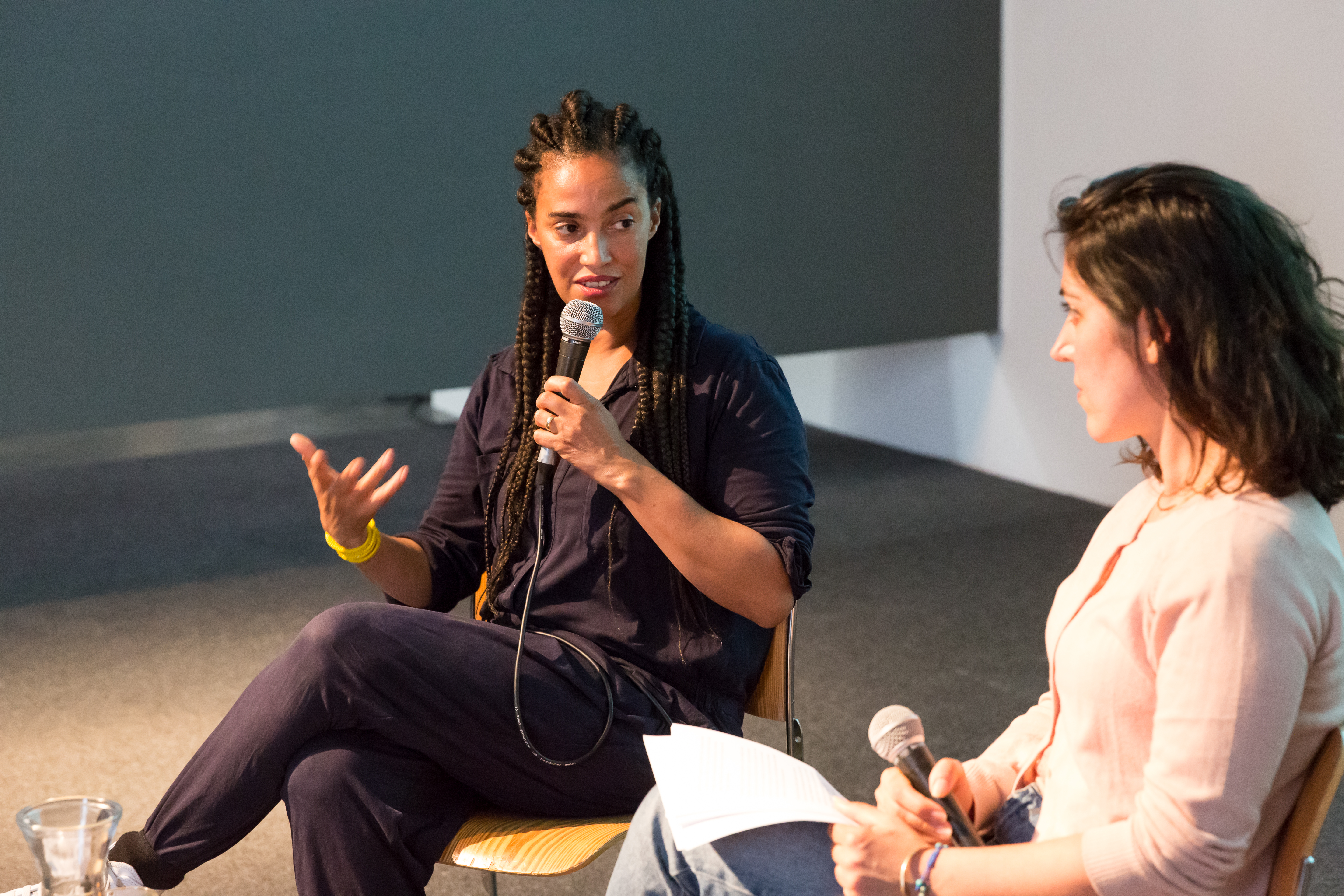Cinema Olanda: Platform [2017]
exhibition and events platform
Witte de With Center for Contemporary Art Rotterdam
two months
with
Pravini Baboeram
First Things First
Grauwe Eeuw
Mercedes Zandwijken
Katayoun Arian
Grada Kilomba
other events
The Black Archives on Tour -
- New Urban Collective ︎
Roet in het Eten - Quinsy Gario ︎
Black Figures, Black Voices - ASCA ︎
Holland my Mars - Charl Landvreugd ︎
back to Cinema Olanda Platform ︎
exhibition and events platform
Witte de With Center for Contemporary Art Rotterdam
two months
with
Pravini Baboeram
First Things First
Grauwe Eeuw
Mercedes Zandwijken
Katayoun Arian
Grada Kilomba
other events
The Black Archives on Tour -
- New Urban Collective ︎
Roet in het Eten - Quinsy Gario ︎
Black Figures, Black Voices - ASCA ︎
Holland my Mars - Charl Landvreugd ︎
back to Cinema Olanda Platform ︎
Decolonial Options - First Things First
A week-long program by First Things First that aims to critically investigate and discuss the coloniality of Dutch Society and beyond. During this week, we will approach this vast subject through five stages of awareness, as formulated by the artists and writer Grada Kilomba in her book Plantation Memories (2008). Through her art and writing, Kilomba uses the concepts of Denial, Guilt, Shame, Recognition and Reparation as tools to understand and overcome the different, and simultaneously existing, dimensions of colonial power structures. By adopting these stages of awareness in our community-led program, we aspire to bridge the gap between different groups and communities for building solidarity, strength, empowerment and raising consciousness and awareness. Decolonial Options: The Futurity of Decolonial Practice operates as an invitation to consider the ways in which we can break out of the colonial mould of being, knowledge and power. The program will be concluded with the performance ILLUSIONS, by Grada Kilomba herself. First Things First consists of Katayoun Arian (Researcher, Independent Curator, Writer), Louise Autar (Activist, Organizer) and Max de Ploeg (Political and Cultural Programmer).
Denial, Guilt, Shame
In Denial, Guilt, Shame, First Things First (Katayoun Arian, Louise Autar, Max de Ploeg) will open the discussion about the currents of decolonial practice in the Netherlands, departing from the question: What does it mean to decolonise and what are the ethical questions that underlie the project of decolonisation?
Starting with an introduction of the trajectory in coming to this program, followed by a panel of three guests who are active in Dutch decolonial debates and actions, including Pravini Baboeram and de Grauwe Eeuw, this event sheds light on the ways in which perceived ego defense mechanisms, denial, guilt and shame, factor in decolonial practice.
The work of Grada Kilomba is paramount to this endeavor. In her book Plantation Memories (2008), Kilomba described "five different ego defense mechanisms the white subject goes through in order to be able to listen, that is in order to become aware of its own whiteness and of itself as a performer of racism: denial / guilt / shame / recognition / reparation" (Kilomba, 2008: 22). In Denial, Guilt, Shame, First Things First employs the first three stages of awareness that Kilomba recognized in her work as tools to uncover coloniality.
Further, at the heart of the event Denial, Guilt, Shame lies the question: "What does it mean to speak at the centre (in this case, Witte de With Center for Contemporary Art) when the absence of the voice of the colonized (from the centre) can be read as emblematic of the difficulty of recovering the voice of the colonial subject, and as a confirmation that there is no space where the colonized subject can speak" (Kilomba, 2008: 27)?
Denial, Guilt, Shame is part of 'Decolonial Options: The Futurity of Decolonial Practice', a program by First Things First, from 10 to 16 July, 2017, that aims to critically investigate and discuss the coloniality of Dutch society and beyond. During a closed workshop, and the final program of 'Decolonial Options', the performance ILLUSIONS by Grada Kilomba herself (Friday 14th July), First Things First strive to articulate through discussion, performance, and dialogue, the last two stages of awareness: Recognition and Reparation.
youtube link ︎
![]()
![]()
![]()
Photographs by Aad Hoogendoorn
ILLUSIONS, Grada Kilomba
In this performance, previously staged at the Biennale de Sao Paulo (2016), artist Grada Kilomba brings the oral African tradition of storytelling into a contemporary context to recover the memories and realities of a neo-colonial world. The artist explores the coexistence of times through her recasting of the myths of Narcissus and Echo, in which the present seems suffocated by a colonial past. Through her performance, she poses the question: How do we break out of this colonial and patriarchal mould? The performance will be followed by a Q&A with the artist, moderated by Katayoun Arian.
ILLUSIONS by Kilomba is curated by Arian as part of First Things First's program ‘Decolonial Options: The Futurity of Decolonial Practice’. During a week-long program in the framework of the exhibition Cinema Olanda: Platform, First Things First aims to critically investigate and discuss the coloniality of Dutch society and beyond by inviting divergent actors whose works circle around decoloniality in one closed, and two public events. What does it mean to decolonise and what are the ethical questions that underlie the project of decolonisation?
youtube link ︎
![]()
![]()
![]()
![]()
Photographs by Aad Hoogendoorn
back to Cinema Olanda Platform ︎
A week-long program by First Things First that aims to critically investigate and discuss the coloniality of Dutch Society and beyond. During this week, we will approach this vast subject through five stages of awareness, as formulated by the artists and writer Grada Kilomba in her book Plantation Memories (2008). Through her art and writing, Kilomba uses the concepts of Denial, Guilt, Shame, Recognition and Reparation as tools to understand and overcome the different, and simultaneously existing, dimensions of colonial power structures. By adopting these stages of awareness in our community-led program, we aspire to bridge the gap between different groups and communities for building solidarity, strength, empowerment and raising consciousness and awareness. Decolonial Options: The Futurity of Decolonial Practice operates as an invitation to consider the ways in which we can break out of the colonial mould of being, knowledge and power. The program will be concluded with the performance ILLUSIONS, by Grada Kilomba herself. First Things First consists of Katayoun Arian (Researcher, Independent Curator, Writer), Louise Autar (Activist, Organizer) and Max de Ploeg (Political and Cultural Programmer).
Denial, Guilt, Shame
In Denial, Guilt, Shame, First Things First (Katayoun Arian, Louise Autar, Max de Ploeg) will open the discussion about the currents of decolonial practice in the Netherlands, departing from the question: What does it mean to decolonise and what are the ethical questions that underlie the project of decolonisation?
Starting with an introduction of the trajectory in coming to this program, followed by a panel of three guests who are active in Dutch decolonial debates and actions, including Pravini Baboeram and de Grauwe Eeuw, this event sheds light on the ways in which perceived ego defense mechanisms, denial, guilt and shame, factor in decolonial practice.
The work of Grada Kilomba is paramount to this endeavor. In her book Plantation Memories (2008), Kilomba described "five different ego defense mechanisms the white subject goes through in order to be able to listen, that is in order to become aware of its own whiteness and of itself as a performer of racism: denial / guilt / shame / recognition / reparation" (Kilomba, 2008: 22). In Denial, Guilt, Shame, First Things First employs the first three stages of awareness that Kilomba recognized in her work as tools to uncover coloniality.
Further, at the heart of the event Denial, Guilt, Shame lies the question: "What does it mean to speak at the centre (in this case, Witte de With Center for Contemporary Art) when the absence of the voice of the colonized (from the centre) can be read as emblematic of the difficulty of recovering the voice of the colonial subject, and as a confirmation that there is no space where the colonized subject can speak" (Kilomba, 2008: 27)?
Denial, Guilt, Shame is part of 'Decolonial Options: The Futurity of Decolonial Practice', a program by First Things First, from 10 to 16 July, 2017, that aims to critically investigate and discuss the coloniality of Dutch society and beyond. During a closed workshop, and the final program of 'Decolonial Options', the performance ILLUSIONS by Grada Kilomba herself (Friday 14th July), First Things First strive to articulate through discussion, performance, and dialogue, the last two stages of awareness: Recognition and Reparation.
youtube link ︎
Photographs by Aad Hoogendoorn
ILLUSIONS, Grada Kilomba
In this performance, previously staged at the Biennale de Sao Paulo (2016), artist Grada Kilomba brings the oral African tradition of storytelling into a contemporary context to recover the memories and realities of a neo-colonial world. The artist explores the coexistence of times through her recasting of the myths of Narcissus and Echo, in which the present seems suffocated by a colonial past. Through her performance, she poses the question: How do we break out of this colonial and patriarchal mould? The performance will be followed by a Q&A with the artist, moderated by Katayoun Arian.
ILLUSIONS by Kilomba is curated by Arian as part of First Things First's program ‘Decolonial Options: The Futurity of Decolonial Practice’. During a week-long program in the framework of the exhibition Cinema Olanda: Platform, First Things First aims to critically investigate and discuss the coloniality of Dutch society and beyond by inviting divergent actors whose works circle around decoloniality in one closed, and two public events. What does it mean to decolonise and what are the ethical questions that underlie the project of decolonisation?
youtube link ︎




Photographs by Aad Hoogendoorn
back to Cinema Olanda Platform ︎